|
|
|
Sort Order |
|
|
|
Items / Page
|
|
|
|
|
|
|
| Srl | Item |
| 1 |
ID:
151302
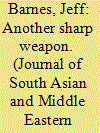

|
|
|
| 2 |
ID:
140557
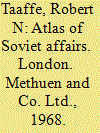

|
|
|
|
|
| Publication |
London, Methuen and co. ltd., 1968.
|
| Description |
x, 143p.pbk
|
| Standard Number |
416948804
|
|
|
|
|
|
|
|
|
|
|
|
Copies: C:1/I:0,R:0,Q:0
Circulation
| Accession# | Call# | Current Location | Status | Policy | Location |
| 001840 | 911.47/TAA 001840 | Main | On Shelf | General | |
|
|
|
|
| 3 |
ID:
127349
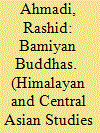

|
|
|
| 4 |
ID:
118502
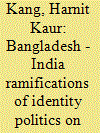

|
|
|
| 5 |
ID:
019767
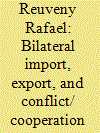

|
|
|
|
|
| Publication |
March 2001.
|
| Description |
131-158
|
|
|
|
|
|
|
|
|
|
|
|
|
|
|
|
| 6 |
ID:
113065
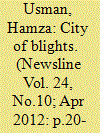

|
|
|
| 7 |
ID:
103050


|
|
|
| 8 |
ID:
127344
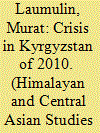

|
|
|
| 9 |
ID:
096197
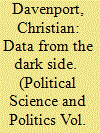

|
|
|
|
|
| Publication |
2010.
|
| Summary/Abstract |
I had interacted with professor Imari Obadele for quite some time at the National Conference of Black Political Scientists (NCOBPS). He is an elder scholar whom I knew had been politically active in the past but I was not aware of his specific affiliations or activities. At the time we first met, Obadele was only known to me as a political scientist at Prairie View. I had just begun my first job at the University of Houston a few years before. As there were not many elder black political scientists that I knew at the time, especially one interested in social movements and revolution, we immediately hit it off. It was not until a year or so after we first met and after I had published some research on the Black Panther Party (Davenport 1998a; Dahlerus and Davenport 1999; Davenport and Eads 2001), that we really started to interact.
|
|
|
|
|
|
|
|
|
|
|
|
|
|
|
|
| 10 |
ID:
117583
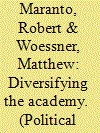

|
|
|
|
|
| Publication |
2012.
|
| Summary/Abstract |
Researchers have long recognized that higher education is dominated by professors whose politics are well to the left of the American political center. The cause and implications of this ideological imbalance have been intensely debated since the 1960s. Although critics of higher education, such as David Horowitz, argue that the political imbalance in academia is largely the result of ideological discrimination, emerging research on the views, values, and experiences of the professoriate tells a more complex story. Despite the relatively small numbers in the academy, the findings suggest that many conservative scholars can succeed in a predominantly liberal environment. Drawing on the latest research, as well as their own personal experience, the authors outline steps that conservative faculty can take to avoid needless political conflict and work happily in a profession largely dominated by the Left.
|
|
|
|
|
|
|
|
|
|
|
|
|
|
|
|
| 11 |
ID:
088750
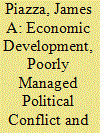

|
|
|
|
|
| Publication |
2009.
|
| Summary/Abstract |
Terrorism is frequently argued to be the product of poverty and poor levels of economic development in countries. Examining the distribution of terrorist attacks and casualties due to terrorism across the states of India, this article demonstrates that the phenomenon of terrorism is not a clear product of poor economic development but rather exacerbated by unresolved and poorly managed political conflict. Poorer states in India are not necessarily more prone to terrorism, but states that have outstanding and poorly addressed political disputes do experience a disproportionately high level of terrorist activity. This study examines six sources of political conflict that contribute to terrorism in India-separatist movements, ethnic conflict, communal conflict, the presence of scheduled castes and tribes, high population growth, and the phenomenon of stateless areas-and makes several observations on the successes and failures of Indian counterterrorism policy
|
|
|
|
|
|
|
|
|
|
|
|
|
|
|
|
| 12 |
ID:
160291
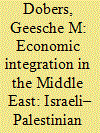

|
|
|
|
|
| Summary/Abstract |
Violent political conflict results in socioeconomic fragmentation and hampers economic development. In contrast, trade crucially depends on cooperation. The article empirically analyses at the micro-level whether economic interactions affect political attitudes. Trading relations between Israelis and Palestinians are found to be extensive despite the conflict. Education and personal social networks facilitate contacts. Israeli traders do not see themselves as affected by the conflict, but wish for its quick settlement. This lends support to the Rational Group Conflict Theory and the Theory of Liberal Peace. Daily contacts are found to create positive functional interdependence which may be effective in fostering reconciliation in the Middle East.
|
|
|
|
|
|
|
|
|
|
|
|
|
|
|
|
| 13 |
ID:
157765
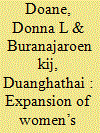

|
|
|
|
|
| Summary/Abstract |
This study examines the political implications of women’s participation in social movements in Thailand. Based on interviews at protest sites and focus group discussions with movement participants as well as interviews with leaders and key informants, the study suggests that political socialization within what is commonly called the color-coded movements has resulted in women acquiring political knowledge and learning about political engagement while being increasingly accepted as competent political actors. Consequently, women have utilized the Red and Yellow Shirt movements to increase their engagement in politics in three different ways. First, women form groups to enhance their political roles and opportunities within the movements. Second, women are expanding their political roles beyond those offered by the color-coded movements by becoming informal representatives, bridging their communities with formal political agents and institutions. Finally, women are increasingly entering into formal politics through the support of their movements.
|
|
|
|
|
|
|
|
|
|
|
|
|
|
|
|
| 14 |
ID:
133135
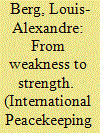

|
|
|
|
|
| Publication |
2014.
|
| Summary/Abstract |
The mixed results of efforts to reform the governance of security forces in the aftermath of conflict require deeper examination of the political constraints that shape statebuilding processes. In Bosnia and Herzegovina, attempts to restructure and centralize the security forces led to a substantial though incomplete reform of the military, but limited impact on the police forces. These uneven results are rooted in the nature of political coalitions that constrain recipient leaders and shape their interaction with external actors. While Bosnian leaders mostly relied on a cohesive political base that favoured close links between political parties and the police forces, fragmentation within these parties generated internal threats that enabled reforms to the military. This case demonstrates the limits of external influence without changes to underlying political conditions.
|
|
|
|
|
|
|
|
|
|
|
|
|
|
|
|
| 15 |
ID:
153745
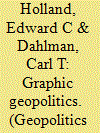

|
|
|
|
|
| Summary/Abstract |
Joe Sacco is best known for works that blend journalism with the format and structure of comic books. Sacco’s prior work has considered themes of political conflict, legacies of violence, and marginalization across a range of geographic contexts, including Bosnia, the Middle East, and the United States. This interview, conducted by the authors with Joe Sacco on 16 November 2015, explores these and other themes in an attempt to situate the positionality and choices of the creator of geopolitical narratives in the broader literature on critical geopolitics. We consider the themes of subject, representation, audience response, and stylistic influences, among others, in our conversation.
|
|
|
|
|
|
|
|
|
|
|
|
|
|
|
|
| 16 |
ID:
119746
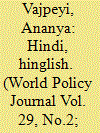

|
|
|
|
|
| Publication |
2012.
|
| Summary/Abstract |
New Delhi-India has 1.2 billion people speaking the 15 official languages printed on every currency note. There's just no room on the Indian rupee for the hundreds of other languages and dialects spoken across the country. For a traveler, India can feel like Babel itself. Yet, most Indians manage to communicate with one another. The country won its independence from British rule in August 1947, and until the mid-1960s, it seemed as though the centrifugal force of linguistic difference, which also flagged cultural difference, would balkanize the new republic. But since the partition of Pakistan over six decades ago, India has hung together. If sometimes it seems precariously close to disintegration-thanks to internal religious or political conflict-then it is no longer because Indians expect their separate languages to count as the bases for distinct nationalities, as they did in the early phase of decolonization.
|
|
|
|
|
|
|
|
|
|
|
|
|
|
|
|
| 17 |
ID:
172051


|
|
|
|
|
| Summary/Abstract |
This article presents new, original data on food riots and protests between 2005 and 2015 and explores the societal conditions in which these events occurred. These conditions include a range of economic, social, demographic, political, and household consumption factors, with reference to a number of conflict theories. The article explores whether instability related to food prices should be seen as an expression of hunger within the most vulnerable and deprived societies, or a demonstration of grievances rooted in broader political contestation. The article also contributes to debates about the methodological challenges of focusing on food prices as a factor relevant to instability and conflict, and the question of whether food riots have significance to broader debates about conflict.
|
|
|
|
|
|
|
|
|
|
|
|
|
|
|
|
| 18 |
ID:
114832
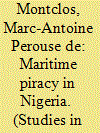

|
|
|
|
|
| Publication |
2012.
|
| Summary/Abstract |
Focused on maritime piracy in the oil-producing Niger Delta (Nigeria), this article addresses three main questions. First, how can we measure the escalation or decrease of criminal violence at sea? Secondly, what is the relationship between piracy and the (permanent) crisis of the state in Africa? Finally, what is the relationship between violence at sea and conflicts onshore? Actually, there are not enough data to monitor the real trend of maritime piracy in Nigeria. Another difficulty is that statistics and the international community focus on attacks against "big" commercial boats and the oil industry. As a result, they ignore "small" trawlers and fishermen who are the first victims of pirates in terms of homicides. Moreover, quantitative monitoring does not give details on the political economy of piracy. Too often, security analysts provide simplistic explanations that point to usual stereotypes on Africa: poverty, the failure of the state, etc. But the problem is more complex. The modernization of maritime piracy is different from a quantitative growth and has a lot to do with the local dynamics of political conflicts and crime in the oil-producing coastal states of Nigeria.
|
|
|
|
|
|
|
|
|
|
|
|
|
|
|
|
| 19 |
ID:
132945
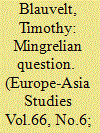

|
|
|
|
|
| Publication |
2014.
|
| Summary/Abstract |
Based on primary source materials from the Georgian Party archive and periodical press, this article examines the conflict between central and local elites in the Soviet Republic of Georgia over whether or not to grant linguistic and territorial rights to residents of one of its regions. The case demonstrates how the promises and aspirations of Soviet nationality policy were actually negotiated and interpreted on the local level in the early years of Soviet power, and how actors attempted to make use of nationality policy in order to mobilise the institutional resources available to them.
|
|
|
|
|
|
|
|
|
|
|
|
|
|
|
|
| 20 |
ID:
106505
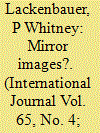

|
|
|
|
|
|
|
|